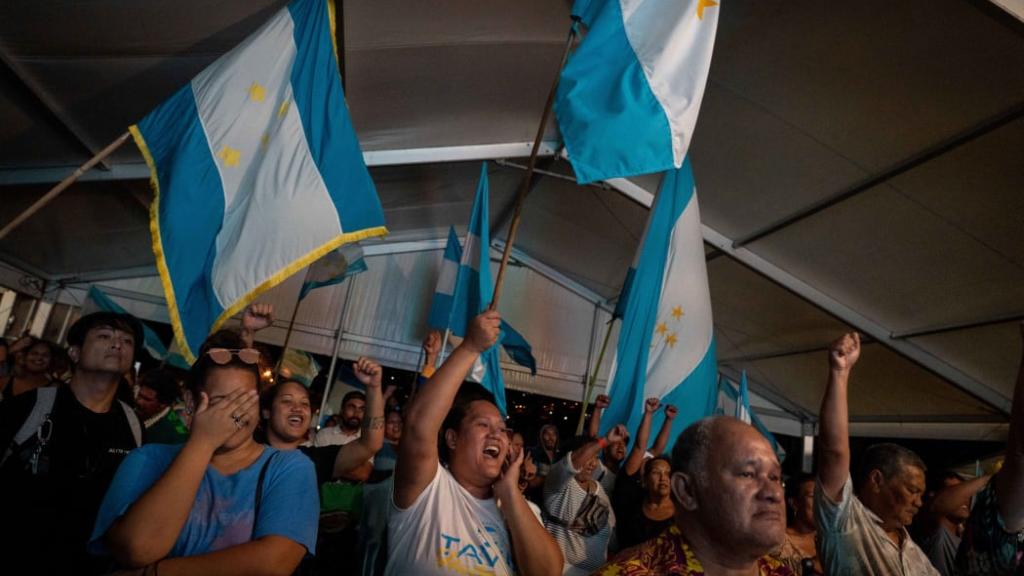Pro-independence victories in French Polynesia

First published at International Viewpoint.
On 30 April, the Polynesian pro-independence Tavini party won a solid majority in the Territorial Assembly for the first time. This confirms a real change in the political landscape in the archipelago, marked last year by the victory of the Tavini for the three seats in the French National Assembly, with the three MPs sitting in the GDR (Communists and Overseas)-Nupes group.
Since it was founded in 1977 around Oscar Temaru, the FLP (Front de libération de la Polynésie), then Tavini huira’atira, has fought for decolonisation and independence for the 300,000 inhabitants of the archipelago known as French Polynesia. This struggle led to the country being reinstated on the UN list of territories to be decolonised, and above all to the fight against nuclear testing.
The nuclear issue
With French Polynesia, French imperialism has an exclusive economic zone (EEZ) of 4.5 million km2, i.e. almost 40% of the total surface area of 11.6 million km2, making France the largest EEZ ahead of the United States. France has always blocked any process of independence and retains regal control over the territory (currency, justice, army and police, diplomacy).
As far as nuclear testing is concerned, France, forced by the revolution to stop testing in southern Algeria in 1966, decided to impose 193 aerial and then underground explosions on Polynesia from 1966 to 1996, after considering the French Alps, Corsica, Réunion and New Caledonia. While Polynesia’s Gaullist and autonomist right-wingers have always supported the tests and the heavy presence of a garrison economy (through the Pacific Test Centre bringing together 10,000 metropolitan French and thousands of Polynesians), Tavini has always fought nuclear testing, even bringing a complaint against France for crimes against humanity before the ICC in 2018.
Spectacular results
Although Oscar Temaru, the main founder of Tavini huira’atira-FLP in 1977, has been President of Polynesia on several occasions since 2004, there has never been a stable pro-independence majority in the Territorial Assembly. The 2023 election saw the autonomist camp (Edouard Fritch’s Tapura and Gaston Flosse’s Taho’era’a) collapse from 77% of the vote in 2018 to 38.5% in 2023, while the Tavini increased from 23.1% to 44.3%. The Polynesian electoral system, with a bonus for the list that comes first, gives 38 seats out of 57 to the Tavini, and the post of President of Polynesia, which holds executive power (elected by the Assembly), has just gone to Moetai Brotherson.
These spectacular results can be explained less by a sudden surge in the demand for independence than by the rejection of the Fritch-Flosse system, local supporters of Macron and the Republicans, with its calamitous management of the pandemic and, above all, a serious worsening of living conditions for the population. In fact, the Tavini’s activity and campaign have focused on purchasing power, demonstrating its solid base among the working classes of the archipelago.
Major social crisis
Even before inflation soared in 2022, Polynesians were living in a deplorable economic situation, with salaries on average 40% lower than in France and a cost of living 40% higher, due in particular to the heavy burden of imports, including the fuel used to power the thermal power stations. The situation has only worsened over the past year, with official inflation forecast at 8.5% for 2022, but the cost of food and energy is much higher. Average values do not reflect the incomes of a large proportion of the population, with one in two people of working age out of work. The poverty rate was officially 21.9% in 2019. In 2015, families living below the poverty line had an average of €1,200 for a household of six people.
Polynesia’s social and tax system is managed by local laws: there is no income tax, inheritance tax or wealth tax, and corporation tax can be easily circumvented, all of which greatly limits resources for social redistribution and maintains serious social inequalities. The latest “family budget” survey carried out by the ISPF (French Polynesia Institute of Statistics) in 2015 showed a society twice as unequal as in France: the richest 10% enjoy incomes on average nine times higher than the poorest 10%.
Nuclear - an ongoing problem
Despite Macron’s grand declarations on the “nuclear debt’, the consequences of 30 years of nuclear testing have still not been dealt with by France, which is blocking the vast majority of compensation claims, playing down the proportion of the population affected by radiation, as well as their descendants, and failing to take into account the heavy burdens borne by the Polynesian Social Security Fund. In 2021, the Fund estimates that it will have spent 670 million euros on radiation-induced illnesses, while Polynesian women between the ages of 40 and 50 have the highest rate of thyroid cancer in the world. This issue will undoubtedly be one of the first to be raised by the new majority in the Assembly.
It is clear that while the pro-independence movement intends to keep the country on course for independence in the medium term (10 to 15 years), its political line is to impose a partnership that will force France to take its debt into account and move forward with a process that will create the economic and social conditions for independence.
Leon Crémieux is an activist of the Solidaires trade-union federation and of the New Anti-Capitalist Party (NPA, France). He is a member of the Executive Bureau of the Fourth International.